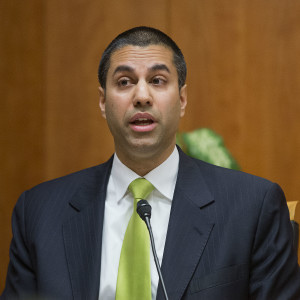The Federal Communications Commission’s most aggressive Internet regulations ever enacted are about to go on trial in federal court, where cable, broadband and wireless representatives will argue to repeal the rules Friday.
A three-judge panel on the D.C. Circuit Court of Appeals will hear marathon two hour-plus oral arguments from the FCC and from U.S. Telecom — a trade group representing AT&T, Verizon, Century Link and others — for and against the agency’s recently adopted Open Internet Order.
The order, adopted in February and effective as of June, is the agency’s second attempt at codifying net neutrality standards for Internet service providers (ISPs), including banning content blocking, web traffic throttling and paid prioritization. The same court threw out similar rules last year after deeming them unenforceable over the Internet, previously classified as an information service.
That led the FCC to take a step further in its second order, reclassifying ISPs as public utility common carrier services similar to telephones, and giving the agency more regulatory power over ISPs, including consumer protection and rate regulation.
The FCC, backed by the White House, argues that the growing importance of the Internet to everyday communications and activities necessitates the change. The Obama administration contends the rules are aimed at protecting consumers from unfair business practices by ISPs, including censoring and favoring certain content for users and edge providers, such as Netflix, Amazon and YouTube, willing to pay more.
But for many Republicans and their allies in the broadband industry, the expansion of regulatory authority is an unconstitutional power grab by the Obama administration.
In briefs submitted to the court earlier this year, broadband industry representatives argued the FCC exceeded its authority, as well as previous legal and regulatory precedent, with public utility reclassification under Title II of the 1996 Telecommunications Act, and that the agency shouldn’t be allowed to overwrite years of policy exempting the Internet from such regulation.
Former FCC Commissioner Robert McDowell, who served as head of the commission during the latter half of the George W. Bush administration and first half of the Obama administration, said in a statement Thursday he agrees the commission exceeded its authority with the second Open Internet Order.
“The FCC overreached beyond its authority when it classified the Internet as a utility,” McDowell said in a statement to InsideSources. “This is especially true in regard to wireless broadband, which Congress explicitly prohibited the FCC from reclassifying as a utility when it wrote section 332. I believe the court is highly likely to overturn this misguided FCC decision.”
“Because the FCC is likely to lose in court for a third time, all parties to this dispute should work together, in good faith, with Congress to forge a workable consensus.”
One of the judges on the panel, Circuit Judge David Tatel, was the deciding judge in two prior court battles that quashed more modest FCC net neutrality enforcement attempts.
RELATED: These Judges Will Decide the Fate of the Internet in December
Republican FCC Commissioner Ajit Pai, who dissented on and has been an outspoken critic of the rules alongside Commissioner Michael O’Rielly, said despite Tatel’s presence on the court, there’s no clear outcome in sight.
“As for where the other two judges might come down, it’s a complete crapshoot,” Pai previously told InsideSources. “I think a lot of people are trying to read some tea leaves, if there are any, but I’m just going to sit back and watch, and hopefully the court makes a decision that’s appropriate based on the law.”
RELATED: FCC’s Pai: Net Neutrality Court Challenge ‘A Complete Crapshoot’
Wherever the court lands, it isn’t likely to be the end of the debate. Pai and others speculate a final move on the rules could spill over into Congress, where Senate Commerce, Science and Transportation Committee Chairman John Thune, R-S.D., is working on legislation to legally ban content throttling, blocking and paid prioritization — the core tenants touted by net neutrality supporters — while abstaining from Title II reclassification.
“There are many avenues for rolling back the agency’s rules,” Pai said last month. “They could be vacated by a court. They could be reversed by Congress. Or they could be overturned by a future FCC.”
“About nine months later, I am still optimistic that these regulations’ days are numbered.”
Given the extreme relevance of the issue, it’s also likely to end up before the Supreme Court, according to High Tech Forum Founder Richard Bennett.
“This promises to be the telecom policy event of the year, anticipated since President Obama made his infamous YouTube program urging his appointees to change course and drop the nuclear option on Internet Service Providers,” Bennett wrote Thursday.
“It’s likely that it won’t be the end of the road for the controversy over how to regulate Internet services, as most outcomes at the appellate level beat a path the Supreme Court.”

